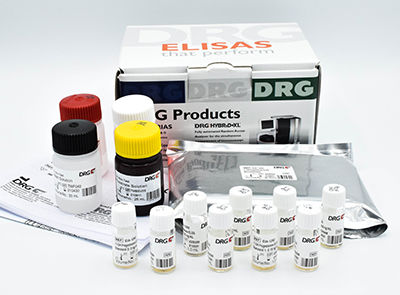
- Laboratory
- Laboratory medicine
- Osteoporosis test kit
- DRG Instruments GmbH
Calcitonin test kit EIA3648osteoporosisclinicalserum
Add to favorites
Compare this product
Characteristics
- Applications
- osteoporosis
- Tested parameter
- for calcitonin
- Sample type
- clinical, serum, biological
- Analysis mode
- immunoassay, ELISA
- Result display time
4 min, 30 min
- Sample volume
0.01 ml
(0.00034 US fl oz)
Description
The Calcitonin ELISA is intended for the quantitative determination of Calcitonin in human serum. The test is for in vitro diagnostic use only. Calcitonin, a 32-amino-acid polypeptide, is secreted primarily by the thyroidal parafollicular C-cells. Its main biological effect is to inhibit osteoclastic bone resorption. This property has led to Calcitonin’s use for disorders characterized by increased resorption such as Paget’s disease, for some patients with osteoporosis.The most prominent clinical syndrome associated with a disordered hypersecretion of Calcitonin is medullary carcinoma of the thyroid (MTC). MTC is a tumor of the Calcitonin producing C-cells of the thyroid gland. Although MTC is rare, comprising 5 - 10% of all thyroid cancer, it is often fatal. It may occur sporadically or in a familial form that is transmitted as an autosomal dominant trait. MTC has great clinical importance because of its familial distribution. Further, it leant itself to be diagnosed early by serum Calcitonin and total cure for early sub-clinical disease is possible[1]. This is frequently associated with other clinical features and it has good potential for cure with surgery. Although a rare tumor, it can occur in a familial pattern[1,3,4] as a Type II multiple endocrine neoplasia. These tumors usually produce diagnostically elevated serum concentrations of Calcitonin. Therefore, the immunoassay for Calcitonin in serum can be used to diagnose the presence of MTC with an exceptional degree of accuracy and specificity. In the small but increasing percentage of patients, however, basal hormone levels are indistinguishable from normal[1].
Catalogs
No catalogs are available for this product.
See all of DRG Instruments GmbH‘s catalogsRelated Searches
- Assay kit
- Blood assay kit
- Serum assay kit
- Immunoassay assay kit
- Plasma assay kit
- Infectious disease detection kit
- Research reagent kit
- Molecular test kit
- Respiratory infection test kit
- Optical assay kit
- Clinical assay kit
- Reagent medium reagent kit
- ELISA assay kit
- Bacteria reagent kit
- Research assay kit
- IgG test kit
- Laboratory detection kit
- Cell assay kit
- Microbiology reagent kit
- Urine assay kit
*Prices are pre-tax. They exclude delivery charges and customs duties and do not include additional charges for installation or activation options. Prices are indicative only and may vary by country, with changes to the cost of raw materials and exchange rates.


